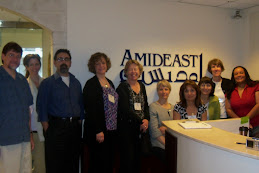On Monday, we visited an American military base in Kuwait—Camp Arifjan. They gave us a folder which included our schedule for the day. At first, I rolled my eyes at the military rhetoric used and the seemingly excessive attention to detail. (They not only had a detailed schedule accounting for every 15 minutes or so of our time, but they had a seating chart on our tour bus and even scheduled a potty break (called “Comfort Break” at 1615). This military order and predictability was so different from what I’d become used to on this trip. I soon realized that although I'm not the type of person who would adapt well to the military, they do have somethint that I'd been craving: a clear-cut message.
Particularly striking was the briefing we received. The person giving the talk said we didn’t have a lot of time, so he would emphasize the three main points he wanted to make: 1) We are on target to support the president’s plans to leave Iraq and build up forces in Afghanistan; 2) We are focused on improving military processes; and 3) we are exceptional stewards of taxpayers’ resources. Then he gave some detailed support for these main ideas.
After this talk, I realized that what I’ve been looking for on this trip, but have not been getting, is this American communication style. I found it so satisfying because it is what I’m used to at home and in fact what I teach in writing classes: Here are the main points I want to make, and here is my support for those points. (Whether or not these points are true is another issue altogether.)
When we’ve meet with Kuwaitis, Qataris and Emiratis, however, we for the most part have not received this kind of clear-cut message. Sometimes it is because the presenters were not very well briefed on who we were and what we were looking for. The other day, for example, we met with a Kuwaiti Political Science professor at Kuwait University. She said our guide organization had called to ask her to speak, but they never told her what they wanted her to speak about. Oh, well.
But, usually the issue is not the preparation, but the strikingly different communication style. Most Arabic speakers I’ve interacted with, such as the Political Science professor mentioned above, tend to use a lot of words, but at the end of the session, I can’t tell what they said and if they even answered the question. In addition to the different communication style is a reluctance by Arabs to talk about anything negative in public. Partly this is to save face, but partly it is to avoid conflict or discomfort.
I’ve realized that it simply isn’t possible to get satisfying, complex and honest answers to questions on sensitive issues in this kind of trip. One or two hours of a group of foreign strangers barraging someone with questions is not going to yield results. I think it would in fact take years of cultivating relationships, which means sitting and talking with people for hours at time week after week, year after year, before there is enough trust and a good enough relationship to get honest dialogue. Plus, I think I would need to speak Arabic for this to work.
In fact, some of the most interesting sessions for me on this trip have been with Westerners who have made this kind of commitment—people who have lived in the Gulf for 20, 30, 40 or more years and are willing and able to talk freely about their experiences here. They have been fascinating to listen to and have, for the most part, been fiercely loyal to people from the Gulf. Obviously, though, most Westerners do not have the time, resources or even will to cultivate such relationships. Herein, methinks, lies at least part of the problem with Arab-American relationships.
Friday, July 2, 2010
Did you just say something?
Subscribe to:
Post Comments (Atom)

No comments:
Post a Comment